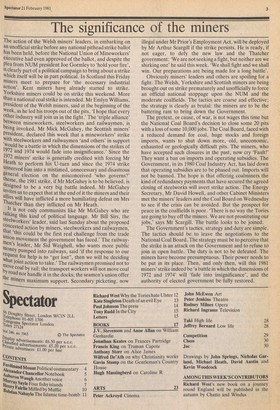The significance of the miners
The action of the Welsh miners' leaders, in embarking on an unofficial strike before any national pithead strike ballot has been held, before the National Union of Mineworkers' executive had even approved of the ballot, and despite the Plea from NUM president Joe Gormley to 'hold your fire', IS clearly part of a political campaign to bring about a strike Which itself will be in part political. In Scotland this Friday miners meet to prepare for 'the necessary industrial action'. Kent miners have already started to strike. Yorkshire miners could be on strike this weekend. More than a national coal strike is intended. Mr Emlyn Williams, president of the Welsh miners, said at the beginning of the week, as he led his troops out of the pits, 'I hope that every Other industry will join us in the fight.' The 'triple alliance' between mineworkers, steelworkers and railwaymen, is being invoked. Mr Mick McGahey, the Scottish miners' President, declared this week that a mineworkers' strike with steelworkers and railwaymen 'and others' in support 'would be a battle in which the dimensions of the strikes of 1972 and 1974 would fade into insignificance.' Since the 1972 miners' strike is generally credited with forcing Mr Heath to perform his U-turn and since the 1974 strike unnerved him into a mistimed, unnecessary and disastrous general election on the misconceived 'who governs?' theme, the 1981 strike, if Mr McGahey is to be believed, is designed to be a very big battle indeed. Mr McGahey invites us to expect that at the end of it the Miners and their allies will have inflicted a more humiliating defeat on Mrs Thatcher than they inflicted on Mr Heath. It is not only communists like Mr McGahey who are talking this kind of political language. Mr Bill Sirs, the steelworkers leader, said last Sunday about the proposed concerted action by miners, steelworkers and railwaymen, that 'this could be the first real challenge from the trade anion movement the government has faced.' The railwayillen's leader, Mr Sid Weighell, who wants more public looney pumped into railways, said 'if the response to our request for help is to "get lost", then we will be deciding at joint action to take.' The railwaymen promised not to 1,110ve coal by rail; the transport workers will not move coal °Y road nor handle it in the docks; the seamen's union offer tne miners maximum support. Secondary picketing, now illegal under Mr Prior's Employment Act, will be deployed by Mr Arthur Scargill if the strike persists. He is ready, if not eager, to defy the new law and the Thatcher government: 'We are not seeking a fight, but neither are we shirking one' he said this week. `We shall fight and we shall win. Our preparations are being made for a long battle'.
Obviously miners' leaders and others are spoiling for a fight. The Welsh, Yorkshire and Scottish miners are being brought out on strike prematurely and unofficially to force an official national stoppage upon the NUM and the moderate coalfields. The tactics are coarse and effective; the strategy is clearly as brutal: the miners are to be the battering ram to bring down the Government.
The pretext, or cause, of war, is not wages this time but the National Coal Board's decision to close some 20 pits with a loss of some 10,000 jobs. The Coal Board, faced with a reduced demand for coal, huge stocks and foreign imports, wants to shut down more, old, uneconomic, exhausted or geologically difficult pits. The miners, who have accepted such closures in the past, now cry `Fault!' They want a ban on imports and operating subsidies. The Government, in its 1980 Coal Industry Act, has laid down that operating subsidies are to be phased out. Imports will not be banned. The hope is that offering coalminers the kind of redundancy payments that have secured the agreed closing of steelworks will avert strike action. The Energy Secretary, Mr David Howell, and other Cabinet Ministers met the miners' leaders and the Coal Board on Wednesday to see if the crisis can be avoided. But the prospect for peace in the coalfields is poor. 'There is no 'way the Tories are going to buy off the miners. We are not prostituting our jobs,' says Mr Scargill. The battle looks to be joined.
The Government's tactics, strategy and duty are simple. The tactics should be to leave the negotiations to the National Coal Board. The strategy must be to perceive that the strike is an attack on the Government and to refuse to join in open battle. The duty is not to be defeated. The miners have become presumptuous. Their power needs to be put in its place. Then, and only then, will this 1981 miners' strike indeed be 'a battle in which the dimensions of 1972 and 1974' will 'fade into insignificance', and the authority of elected government be fully restored.






































 Previous page
Previous page